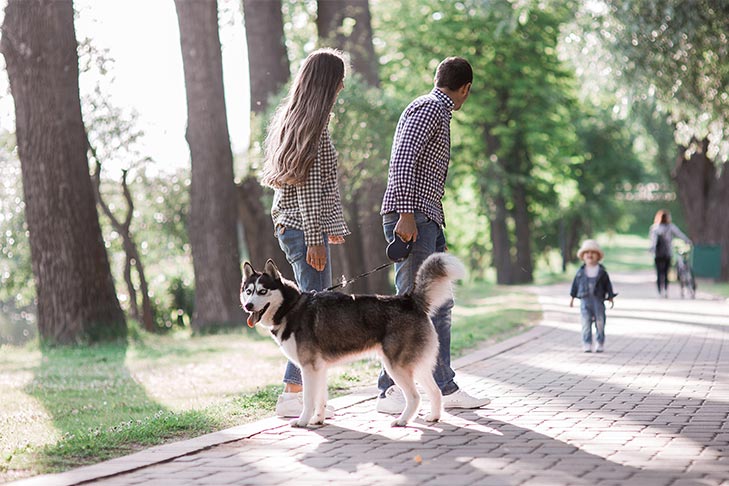
When Caroline Myers moved from New York City to Nashville a few years ago, meeting new people was a priority.
“As a military spouse, moving to a new location is always a challenge,” the 26-year-old social worker explains.
Little did she know that Riley Tucker Myers, her Labrador Retriever, would play a major role in her budding social life.
“I met a girlfriend at the dog park and our friendship shifted from revolving around our dogs to outside of that,” Myers says. “I’ve also used apps to connect with others in the area and one of the best things to have in common is a pup! There’s a great off-leash dog park near our new home where I have met up with people for the first time.”
Nowadays, dogs aren’t just man’s best friend — they can be instrumental in making new friends. A recent poll found that out of the 2,000 dog owners surveyed, nearly half of the participants made friends while walking their dogs. Plus, 60 percent of owners think their dogs have their own furry friends.
“People and dogs share a need for social connection and find this in our relationship with one another,” explains Phil Tedeschi, a human-pet relationship expert and Executive Director of the Institute for Human-Animal Connection at the University of Denver within the Graduate School of Social Work. “This serves a very important interpersonal neurobiological dimension of the sense of wellbeing.”
So what is it about dogs that make them essential socially? And how can you create a bustling social life with both you and your dog in mind?
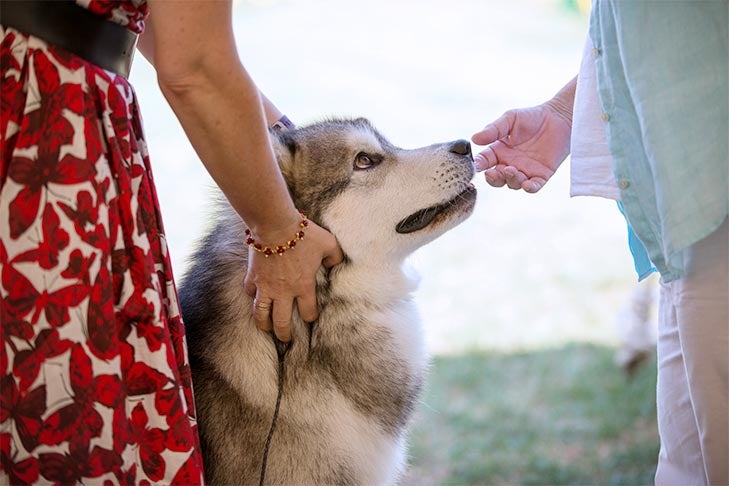
Open to New Connections
Erin Haggerty is always on the move. The 27-year-old account executive has moved three times since owning Bean — her mixed-breed dog — three years ago. But every time she’s moved, Bean has helped her open up to strangers.
“I am better at having random conversations with anyone I happen to bump into,” she explains.” I used to have a hard time talking to just anyone without getting nervous and feeling uncomfortable. But talking about Bean is so easy and a favorite topic so it was easier to have natural conversations.”
Haggerty is not alone. The survey also found 54 percent of participants felt that owning a dog has helped their confidence, making it easier to talk to strangers.
According to Tedeschi, owning a dog not only gives you a boost in confidence, but makes you friendlier and more approachable.
“Dogs don’t only act as important social lubricant and support, they also change the way we interact with other people,” he explains. “Research suggests that our connections with dogs increase our social interactions, evidenced by more openness to others, initiating conversations, focusing toward other people, being more positive, increased physical activity and play, and more laughing.”
In other words, if someone were to approach you and ask questions about your dog, there’s a good chance you’ll be friendly, responsive, and open to a conversation.
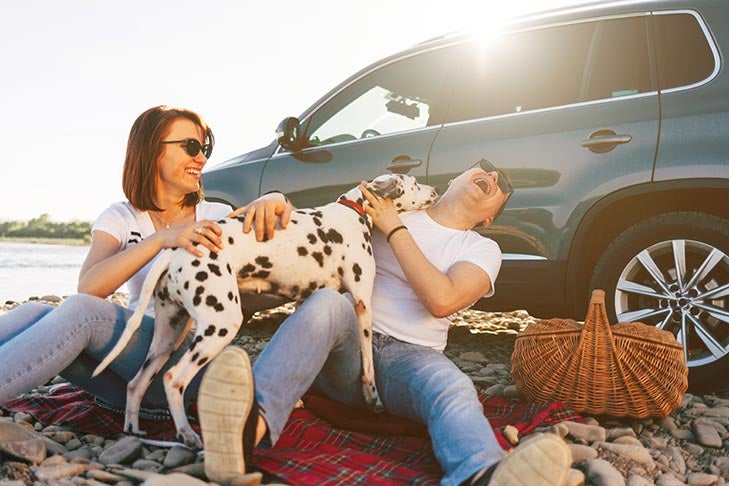
Puppy Love
Turns out, dogs aren’t only helpful in creating new friendships. If their masters are looking for love, dogs are often unwitting matchmakers.
Bella Zaydenberg, a 27-year-old manager, would mention her dog Chloe, who she rescued four years ago, on her dating apps.
“I had ‘My 🐶 swipes for me!’ in my dating profile on-and-off for years,” she says. “I never noticed an uptick or any correlation between having that in my bio, but it helped with my matches asking genuine questions about my dog without just saying, ‘Oh, cute dog.”‘
And while her current boyfriend claimed he wasn’t a big dog person when they first met, Zaydenberg thinks Chloe helped changed his mind. “He went on a trip to Disneyland not long after we started dating, and he bought her souvenir before he bought anyone else’s — including mine,” she shares.
And thanks to a slew of dating apps targeted to dog owners — including Tindog, Dig, and Dog Date Afternoon — it’s possible to spark romance with a fellow pet-lover.
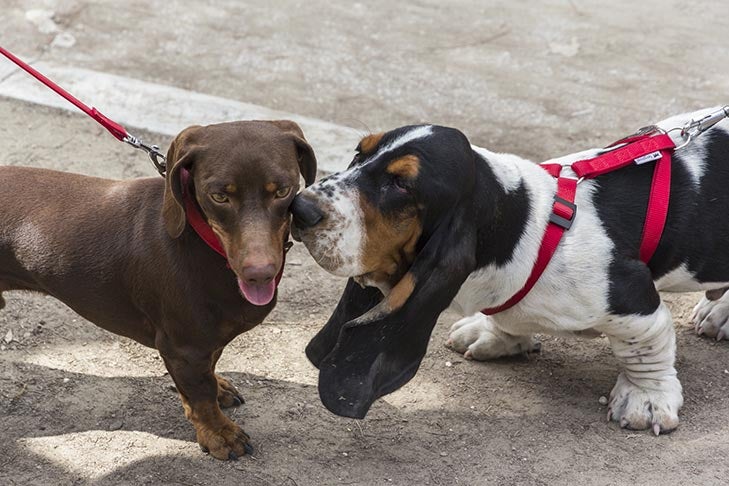
The Relationship with Yourself
While romance and friendship are two very important connections, the relationship you have with yourself is the foundation of your social life. After all, it’s hard to be inspired to forge new connections if you’re feeling stressed, down, or lonely.
Fortunately, your pup can also help with your own mental health. According to a poll sponsored by AARP and Michigan Medicine, the University of Michigan’s academic medical center, 90 percent of people said having a dog helped them enjoy life and feel loved while 80 percent claimed their pets helped them de-stress.
“Increased beta-endorphin, oxytocin, and dopamine, among other health targets — in both humans and their dogs during time shared — show that time spent together is physiologically and psychologically beneficial for both species,” Tedeschi says.
Studies also show owning a pet can increase a person’s physical activity, plus encourage them to create a schedule — and actually stick to it.
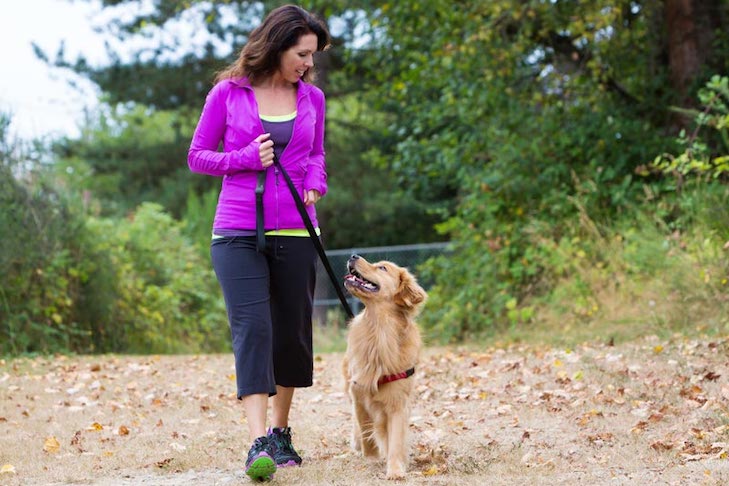
Strike a Balance
Making lasting bonds with other owners and enthusiasts is a great perk to owning a dog, but your social life shouldn’t come at the expense of your pet’s happiness and well-being.
“Many dogs will learn to tolerate some of the actions but may be experiencing distress, fear, and anxiety,” Tedeschi says. “But they conclude that we aren’t respectful or good listeners so learn to accommodate these interactions.”
Just like us, all dogs have different personalities, so it’s important to choose a breed that typically yearns for a similar social life as you.
“We often assume that what we enjoy, our dogs will also enjoy,” Tedeschi adds. “It is critical in understanding our dogs, recognizing that they are capable of telling us what they enjoy and don’t appreciate.”
But whether you have a convivial Corgi or bashful Beagle, it’s always a good idea to start socializing your dog at a young age.
“Socialization of young dogs is critical — especially for dogs that may have a tendency towards being nervous or anxious,” he says. “Introducing puppies to new experiences at a young age expands their horizons and creates a better-adjusted dog.”

